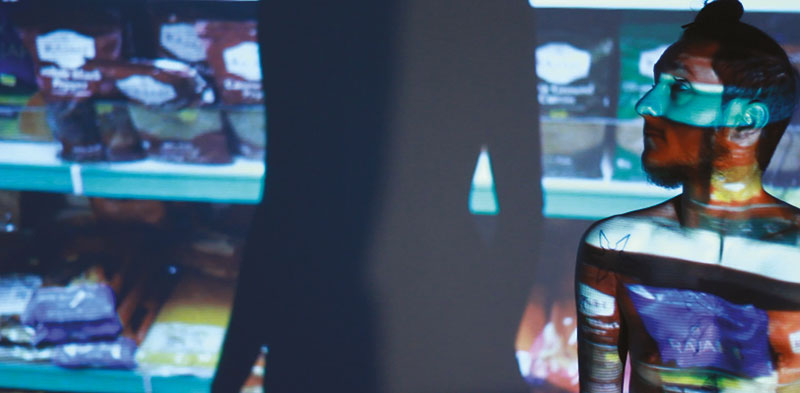
Review of Project/ed Red Pepper Magazine
Glitch in the system
Nim Ralph reviews the UK’s first queer, trans and intersex people of colour film festival
June 2015
 Photo: Raju Rage
Photo: Raju Rage
We are a glitch in the system
Our lives deny the lies
Our complexity is dissent
We fight for love
Digital Desperados hosted Glitch 2015, the UK’s first QTIPoC (queer, trans and intersex people of colour) film festival in Glasgow in March. The festival was designed to inform, educate and encourage discussion in Scotland’s predominantly white queer scene. ‘The programming focus creates recognition of the struggles, joys and complexity of QTIPoC people . . . to open up a space where nuanced, reflective, politically challenging films can be screened and discussed,’ as the organisers put it.
One of the highlights of the festival was Raju Rage’s directorial debut Project/ed, a short film that uses visual projection to unravel the complex layering of identity. Over seven brief minutes we view images of South Asian migration projected on the filmmaker’s gender non-conforming body. Rage uses a single cloth to adorn the body in different ways and interweaves it with image, sound and speech. In this process the film expertly uncovers the subjectivity of identity by exposing its coding through three layers: our bodies, our clothes and the projection of the person coding us.
Richard Fung’s Dal Puri Diaspora also challenges the essentialist idea of identity as fixed and objective. Fung, a proud Trinidadian, has spent his life eating roti, a delicious flat bread, traditionally served in Trinidad with chick peas as ‘doubles’. He sets out on a quest to find the origins of the roti, which migrated to the Caribbean alongside Indian indentured servants through British colonialism. Fung travels through India and follows it to Trinidad and on through the Trinidadian community to Canada, pursuing the multiple stories and journeys that the food has taken.
The film’s brilliance lies in its blending of those stories with the impact of colonialism on those cooking the roti along the way. Like any good cook Fung fuses, sizzles and spices the story with subtlety and skill. His tale takes a revealing turn when he explores the case of a Canadian company attempting to set up a roti fast food chain in India. Therein lies an astute observation on the similarities in power and practice of colonialism and capitalism, and the process of globalisation that accompanies them.
Globalisation was represented too in US filmmaker Malachi Leopold’s Alex and Ali – the story of Leopold’s uncle, Alex, trying to re-unite with the love of his life, Ali. The two men embarked on a secret relationship in Ali’s native Iran in 1967 while Alex was serving as a teacher in the US Peace Corps. A decade later Alex was forced to leave the country in the dawn of the 1979 revolution.
The pair remained in contact through letters and phone calls for three decades until Alex attempted to convince Ali to seek asylum in the US. They agreed to meet in Turkey, where Leopold joined them. The Iranian government became aware of Ali’s plans and he faced torture on his return. Despite this he didn’t want to seek asylum in the US because to do so would involve stating, legally, that he is ‘gay’.
Leopold and his uncle spend the film trying to convince Ali that he is gay and that he will find refuge in the US if only he will admit it. Ali maintains that he defines his own identity and refuses to agree to US/western-imposed definitions on his life and sexuality. Despite this, the closing sentences of the film assert that Ali ‘still refuses to accept that he is gay’.
The programmers describe the film ‘as a controversial choice’, saying they ‘thought we should screen it as it laid bare how one man’s clouded desire partially led to another’s torture’. It parallels the ‘weaponisation’ of sexuality in US foreign policy, whereby ‘enlightened’ attitudes and policy in the west are used a tool to construct the idea of civilised and uncivilised in liberal political discourse.
The lack of awareness of the filmmaker’s own cultural imperialism jarred with the focus on self-identity and autonomy in the rest of the programming. The festival hoped to reflect the complex and diverse experience of QTIPoC lives – lives that fit neither the singular definition of ‘LGBT’ nor ‘people of colour’ but interweave and are changed by cultures, interactions with the state and our other life experiences. In that complexity, they attempted to show, there is dissent.
June 2015
Comments are closed, but trackbacks and pingbacks are open.